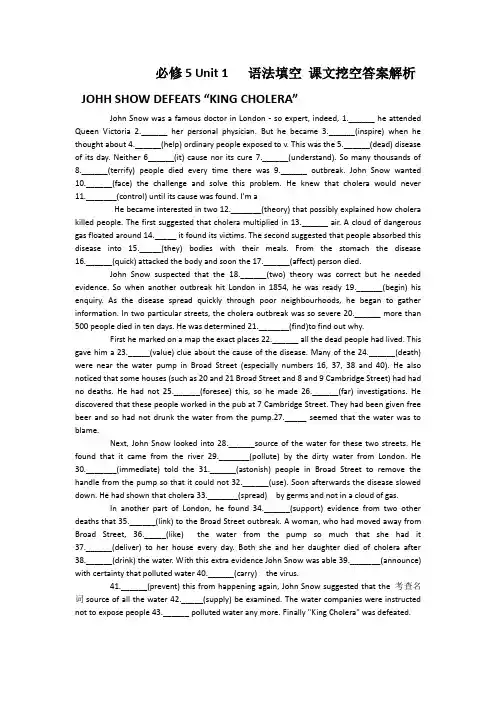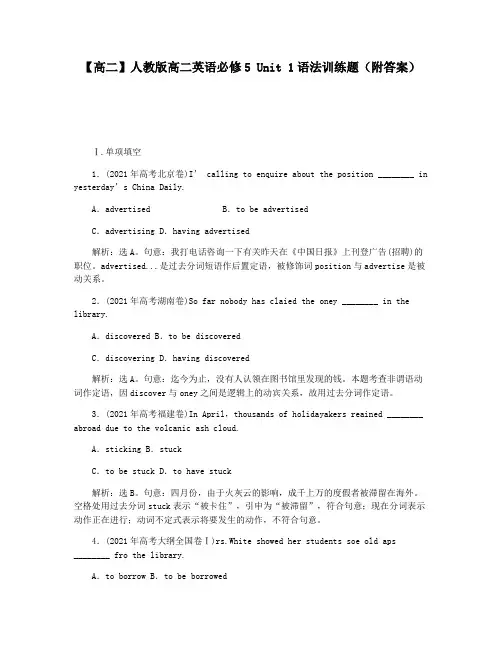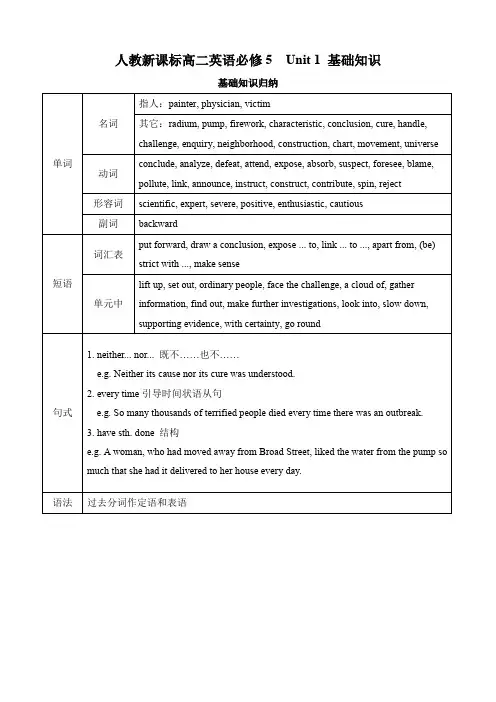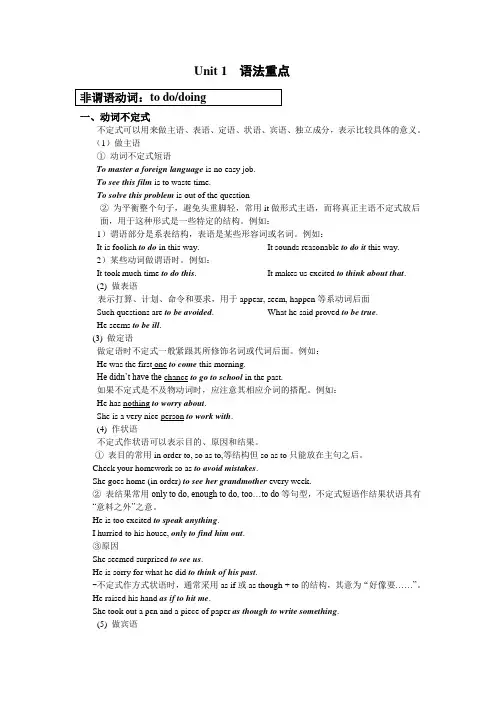人教 高二英语必修五第一单元语法 无答案
人教新课标高二英语必修5Unit1基础知识包含答案

人教新课标高二英语必修 5 Unit 1基础知识基础知识归纳基础知识默写基本单词1. _______ v t.打败;战胜;使受挫n.失败2. _______ a dj.熟练的;经验知识丰富的n.专家;行家3. _______ v t.照顾;护理;出席;参加4. _______ n.治愈;痊愈vt.治疗;治愈5. _______ n.挑战vt.向......... 挑战6. _______ v t.吸收;吸引;使专心7. _______ v t.认为;怀疑n.嫌疑犯8. _______ a dj.严重的;剧烈的;严厉的9. _______ v t.责备;谴责n.过失;责备10. ___________ n.柄;把手vt.处理;操纵11. ___________ v i.& vt.(使)旋转;纺(线或纱)12. ___________ a dj.热情的;热心的13. ___________ n.受害者14. ___________ n.附近;令P近15. ___________ v.预见;预知26. ___________ n.烟火(燃放)27. ___________ n.图表28. ___________ n.移动;运动;动作29. ___________ a dj. & adv.向后地(的);相反地(的);退步地(的)30. ___________ a dj.小心的;谨慎的派生单词31. ____________ t.& vi. 结束; 推断出____________ n.结论;结束32. ____________ vt.暴露;揭露;使曝光____________ adj.无遮蔽的;无保护的____________ n.暴露;揭发33. ____________ vt.污染;弄脏____________ n.污染34. ____________ t.宣布;通告___________ n.通知;宣告35. __________ vt. & vi. 捐献;贡献;捐助__________ n.捐献;贡献;捐助36. __________ vt.拒绝;不接受;抛弃__________ n.拒绝;抛弃37. __________ vt.命令;指示;教导__________ n.指示;说明__________ n.导师,教练38. ________ adj.科学的__________ n.科学_________ n.科学家39. __________ vt.分析___________ n.分析40. __________ adj.积极的;肯定的;确实的___________ adj.消极的;否定的41. __________ n.宇宙;世界___________ adj.宇宙的;普遍的42. __________ n.特征;特性___________ n.品质,性格;特征;字符短语1. 提出______________2. 得出结论______________3. 显露;暴露______________4. 联系/连接______________5. 除……之外;此外______________6. 对……严格的______________7. 讲得通;有意义______________句型1. neither... no r...既不.. 也不...e.g. Neither its cause nor its cure was understood.2. every time引导时间状语从句e.g. So many thousands of terrified people died every time there was an outbreak.3. have sth. done 结构e.g. A woman, who had moved away from Broad Street, liked the water from the pump so much that she had it delivered to her house every day.参考答案基础知识默写基本单词1. defeat2. expert3. atte nd4. cure5. challe nge6.absorb7. suspect 8. severe9. blame 10.handle 11. spin 12.en thusiastic1victim 14. n eighborhood 15.foresee 16. firework 17. chart 18.moveme nt19. backward 20. cautious派生单词21. con elude, con clusi on 22. expose, exposed, exposure23. pollute, pollutio n 24. announ ce, announ ceme nt25. con tribute, con tributi on 26. reject, rejectio n27. in struct, in struct ion, in structor 28. scie ntific, scie nee, scie ntist 29. an alyse, an alysis 30. positive, n egative31. uni verse, uni versal 32. characteristic, character短语1. put forward2. draw a conclusion3. expose ... to4. link ... to...5. apart from6. (be) strict with -7. make sense。
人教 高二英语必修五第一单元语法 无答案

人教高二英语必修五第一单元语法无答案n.b. 过去分词短语作定语:通常后置,其作用相当于定语从句。
people exposed to cholera= people who was exposed to cholerathe book recommended by Jack= the book which was recommended by Jackthe machines produced last year= the machines which were produced last yearc. 不及物动词的过去分词作定语时不表被动,只表完成。
a risen sun已升起的太阳the gone days 逝去的时光fallen leaves 落叶2)现在分词与过去分词作定语的区别:现在分词作定语,表示正在进行的动作;过去分词作定语,所表示的动作在谓语所表示的动作之前发生,(或者没有一定的时间性)。
The letter posted yesterday will soon reach him. Have you read the book recommended by your teacher?这是你老师推荐的书吗?对比:the changing world(正在变化的)the changed world(变化了的)boiling water(正在沸腾的)boiled water(已经沸腾过的)fading flowers(正在凋谢的) faded flowers(已经凋谢的)a developing country(发展中的) a developed country(发达的)a drowning man快要淹死的人 a drowned man已经淹死的人falling leaves正在飘落的树叶fallen leaves落叶a retired worker退休工人an escaped prisoner逃犯3)及物动词的过去分词(done)与现在分词的被动式(being done)都可以表示“被动”,但前者多表示一个完成了的动作,而后者则表示一个正在进行的动作.the problem discussed yesterdaythe problem being discussed过去分词做表语1.过去分词(短语)作表语时,其作用相当于adj.,说明的是主语的状态;All the windows are broken.All hope is gone.He looked worried after reading the letter.常见作表语的过去分词有:disappointed, drunk, amused, frightened, married, excited, experienced, interested, confused, pleased, puzzled, satisfied, tired, worried,gone, dressed, lost等。
人教新课标 必修五 Unit 1 课文挖空 语法填空 带答案解析

必修5 Unit 1 语法填空课文挖空答案解析JOHH SHOW DEFEATS “KING CHOLERA”John Snow was a famous doctor in London - so expert, indeed, 1.______ he attended Queen Victoria 2.______ her personal physician. But he became 3.______(inspire) when he thought about 4.______(help) ordinary people exposed to v. This was the 5.______(dead) disease of its day. Neither 6______(it) cause nor its cure 7.______(understand). So many thousands of 8.______(terrify) people died every time there was 9.______ outbreak. John Snow wanted10.______(face) the challenge and solve this problem. He knew that cholera would never11._______(control) until its cause was found. I'm aHe became interested in two 12._______(theory) that possibly explained how cholera killed people. The first suggested that cholera multiplied in 13.______ air. A cloud of dangerous gas floated around 14._____ it found its victims. The second suggested that people absorbed this disease into 15._____(they) bodies with their meals. From the stomach the disease 16.______(quick) attacked the body and soon the 17.______(affect) person died.John Snow suspected that the 18.______(two) theory was correct but he needed evidence. So when another outbreak hit London in 1854, he was ready 19.______(begin) his enquiry. As the disease spread quickly through poor neighbourhoods, he began to gather information. In two particular streets, the cholera outbreak was so severe 20.______ more than 500 people died in ten days. He was determined 21._______(find)to find out why.First he marked on a map the exact places 22.______ all the dead people had lived. This gave him a 23._____(value) clue about the cause of the disease. Many of the 24.______(death) were near the water pump in Broad Street (especially numbers 16, 37, 38 and 40). He also noticed that some houses (such as 20 and 21 Broad Street and 8 and 9 Cambridge Street) had had no deaths. He had not 25.______(foresee) this, so he made 26.______(far) investigations. He discovered that these people worked in the pub at 7 Cambridge Street. They had been given free beer and so had not drunk the water from the pump.27._____ seemed that the water was to blame.Next, John Snow looked into 28.______source of the water for these two streets. He found that it came from the river 29._______(pollute) by the dirty water from London. He 30._______(immediate) told the 31.______(astonish) people in Broad Street to remove the handle from the pump so that it could not 32.______(use). Soon afterwards the disease slowed down. He had shown that cholera 33._______(spread) by germs and not in a cloud of gas.In another part of London, he found 34.______(support) evidence from two other deaths that 35.______(link) to the Broad Street outbreak. A woman, who had moved away from Broad Street, 36._____(like) the water from the pump so much that she had it37.______(deliver) to her house every day. Both she and her daughter died of cholera after38.______(drink) the water. With this extra evidence John Snow was able 39._______(announce) with certainty that polluted water 40.______(carry) the virus.41.______(prevent) this from happening again, John Snow suggested that the 考查名词source of all the water 42._____(supply) be examined. The water companies were instructed not to expose people 43.______ polluted water any more. Finally "King Cholera" was defeated.考点解析:连词,so......that表示“如此………以至于……”。
【高二】人教版高二英语必修5 Unit 1语法训练题(附答案)

【高二】人教版高二英语必修5 Unit 1语法训练题(附答案)Ⅰ.单项填空1.(2021年高考北京卷)I’ calling to enquire about the position ________ in yesterday’s China Daily.A.advertised B.to be advertisedC.advertising D.having advertised解析:选A。
句意:我打电话咨询一下有关昨天在《中国日报》上刊登广告(招聘)的职位。
advertised...是过去分词短语作后置定语,被修饰词position与advertise是被动关系。
2.(2021年高考湖南卷)So far nobody has claied the oney ________ in the library.A.discovered B.to be discoveredC.discovering D.having discovered解析:选A。
句意:迄今为止,没有人认领在图书馆里发现的钱。
本题考查非谓语动词作定语,因discover与oney之间是逻辑上的动宾关系,故用过去分词作定语。
3.(2021年高考福建卷)In April,thousands of holidayakers reained ________ abroad due to the volcanic ash cloud.A.sticking B.stuckC.to be stuck D.to have stuck解析:选B。
句意:四月份,由于火灰云的影响,成千上万的度假者被滞留在海外。
空格处用过去分词stuck表示“被卡住”,引申为“被滞留”,符合句意;现在分词表示动作正在进行;动词不定式表示将要发生的动作,不符合句意。
4.(2021年高考大纲全国卷Ⅰ)rs.White showed her students soe old aps________ fro the library.A.to borrow B.to be borrowedC.borrowed D.borrowing解析:选C。
人教新课标高二英语必修5 Unit 1 基础知识 含答案

人教新课标高二英语必修5 Unit 1 基础知识基础知识归纳基础知识默写基本单词1. ________ vt.打败; 战胜; 使受挫n. 失败2. ________ adj.熟练的; 经验知识丰富的n.专家; 行家3. ________ vt. 照顾; 护理; 出席; 参加4. ________ n. 治愈; 痊愈vt. 治疗; 治愈5. ________ n. 挑战vt. 向……挑战6. ________ vt. 吸收; 吸引; 使专心7. ________ vt. 认为; 怀疑n. 嫌疑犯8. ________ adj.严重的; 剧烈的; 严厉的9. ________ vt. 责备; 谴责n. 过失; 责备10. ____________ n. 柄; 把手vt. 处理; 操纵11. ____________ vi.& vt. (使) 旋转; 纺(线或纱)12. ____________ adj. 热情的; 热心的13. ____________ n.受害者14. ____________ n.附近; 邻近15. ____________ v.预见;预知26. ____________ n.烟火(燃放)27. ____________ n.图表28. ____________ n.移动; 运动; 动作29. ____________ adj. & adv.向后地(的); 相反地(的); 退步地(的)30. ____________ adj.小心的; 谨慎的派生单词31. _____________ vt.& vi.结束; 推断出_____________ n.结论; 结束32. _____________ vt.暴露; 揭露; 使曝光_____________ adj. 无遮蔽的; 无保护的_____________ n. 暴露;揭发33. _____________ vt.污染; 弄脏_____________ n. 污染34. _____________ vt. 宣布; 通告_____________ n. 通知; 宣告35. ___________ vt. & vi.捐献; 贡献; 捐助___________ n. 捐献; 贡献; 捐助36. ___________ vt. 拒绝; 不接受; 抛弃___________ n. 拒绝; 抛弃37. ___________ vt.命令; 指示; 教导___________ n.指示; 说明___________ n. 导师,教练38. _________ adj.科学的__________ n. 科学__________ n. 科学家39. ____________ vt.分析____________ n. 分析40. ____________ adj.积极的; 肯定的; 确实的____________ adj. 消极的;否定的41. ____________ n.宇宙; 世界____________ adj.宇宙的;普遍的42. ____________ n.特征; 特性____________ n. 品质,性格;特征;字符短语1. 提出_______________2. 得出结论_______________3. 显露; 暴露_______________4. 联系/连接_______________5. 除……之外; 此外_______________6. 对……严格的_______________7. 讲得通; 有意义_______________ 句型1. neither... nor... 既不……也不……e.g. Neither its cause nor its cure was understood.2. every time引导时间状语从句e.g. So many thousands of terrified people died every time there was an outbreak.3. have sth. done 结构e.g. A woman, who had moved away from Broad Street, liked the water from the pump so much that she had it delivered to her house every day.参考答案基础知识默写基本单词1. defeat2. expert3. attend4. cure5. challenge6. absorb7. suspect8. severe9. blame 10.handle 11. spin 12. enthusiastic 13. victim 14. neighborhood 15. foresee 16. firework 17. chart 18. movement19. backward 20. cautious派生单词21. conclude, conclusion 22.expose, exposed, exposure23. pollute, pollution 24. announce, announcement25. contribute, contribution 26. reject, rejection27. instruct, instruction, instructor 28.scientific, science, scientist29. analyse, analysis 30. positive, negative31. universe, universal 32. characteristic,character短语1.put forward2. draw a conclusion3. expose ... to4. link ... to...5. apart from6. (be) strict with…7. make sense。
高二英语必修五unit1语法总结

Unit 1 语法重点一、动词不定式不定式可以用来做主语、表语、定语、状语、宾语、独立成分,表示比较具体的意义。
(1)做主语①动词不定式短语To master a foreign language is no easy job.To see this film is to waste time.To solve this problem is out of the question②为平衡整个句子,避免头重脚轻,常用it做形式主语,而将真正主语不定式放后面,用于这种形式是一些特定的结构。
例如:1)谓语部分是系表结构,表语是某些形容词或名词。
例如:It is foolish to do in this way. It sounds reasonable to do it this way.2)某些动词做谓语时。
例如:It took much time to do this. It makes us excited to think about that.(2) 做表语表示打算、计划、命令和要求,用于appear, seem, happen等系动词后面Such questions are to be avoided. What he said proved to be true.He seems to be ill.(3) 做定语做定语时不定式一般紧跟其所修饰名词或代词后面。
例如:He was the first one to come this morning.He didn’t have the chance to go to school in the past.如果不定式是不及物动词时,应注意其相应介词的搭配。
例如:He has nothing to worry about.She is a very nice person to work with.(4) 作状语不定式作状语可以表示目的、原因和结果。
人教课标版高中英语必修5 Unit1_单元语法详解
Unit1单元语法详解过去分词作定语和表语图解语法过去分词作定语和表语1.过去分词作定语过去分词作定语的位置过去分词作定语的意义现在分词和过去分词作定语的区别2.过去分词作表语用于“主—一系一表”结构中过去分词与被动语态的区别作表语现在分词和过去分词作表语的区别1/ 3归纳语法过去分词,也称动词的-ed形式,是一种非限定动词。
规则动词的-ed形式由动词原形词尾加-ed构成,也有不规则动词变化表。
动词的-ed形式只有一种形式,没有时态和语态的变化。
它在句子中可以充当定语、表语等成分。
一、过去分词作定语1.过去分词作定语时的意义过去分词作定语,强调被动或者完成。
The wind swept the fallen leaves.风刮走了落叶。
Her daughter brought up by me has begun to work.她由我带大的那个女儿已经开始工作了。
fallen leaves 落叶/falling leaves正在飘落的树叶2.过去分词作定语时的位置(1)单个的过去分词作定语,常放在所修饰的词的前面;过去分词短语作定语时,常放在所修饰的词之后,此时,它相当于定语从句。
He told me that this was the wounded soldier.他告诉我这就是那个受伤的士兵。
Don't use words, expressions or phrases known only to people with specific knowledge. 不要使用仅仅有特定知识的人才知晓的单词、词组或短语。
Near the window is a bookshelf filled with books (=which is filled with books).靠近窗户有一个装满书的书架。
2/ 3Most of the students invited to the garden party (=who were invited to the garden party)came from our school.大部分被邀请参加游园会的学生来自我们学校。
人教版高二英语必修五第一单元语法——过去分词
Further information:
Difference between the Present Participle and the Past participle
1 Choose appropriate verbs to complete
the following sentences, using the past participle. Explain the use of the past participle in each sentence. (P43)
-- I hear you and James are engaged at last. -- Yes, we are. -- When are you getting married? -- In the spring. -- Oh, lovely. Where’s the wedding going to be?
6. children who are astonished at/by … 7. a vase that is broken 8. a door that is closed 9. the audience who are tired of … 10. an animal that is trapped in/by …
to take the victims to safe areas from
the flood.
5. Most of the newspaper seems to be
_________ concerned with pop stars.
用来修饰人的过去分词有时可以转移
到修饰非人的事物,变成所谓的转移
形容语。这种过去分词在形式上直接 修饰人,但它所修饰的事物仍与人直 接有关。 The general stared at him in startled admiration. 将军以惊讶而赞赏的眼光注视着他。
高二英语人教版必修五第一单元语法讲解+答案
Book5 Unit1 Great Scientists语法:过去分词作定语和表语Step1:Lead-in 寻规找矩:请找出下面句子中的分词,并说出分别充当什么成分。
1.He became interested in two theories that possibly explained how cholera killed people.2.He became inspired when he thought about helping ordinary people exposed to cholera.3.From the stomach the disease attacked the body quickly and soon the affected person died.4.It came from the river polluted by the dirty water from London.5.He told the astonished people in Broad Street to remove the handle from the water pump so that it could not be used.6.The water companies were instructed not to expose people to polluted water any more.7.So many thousands of terrified people died every time there was an outbreak.整理:污染了的水__ _患者___惊慌失措的人们__ _ 受霍乱影响的人们__ _ 被脏水污染了的河流__ _ 恐惧的人们__ _Step2: 过去分词作定语(相当于一个定语从句)一、过去分词作定语的位置①单个的过去分词作定语,常置于被修饰词前。
人教版必修5UNIT1语法
• The house built over there is a shop. (被动、已建好)
(4) 过去分词和现在分词在做定语时的区别: 过去分词表示被动或完成; 现在分词表示主动或进行。
Have you read the books written by the young writer?
They found a damaged car at the gate of the park.
• I know the people building the house there. (主动、进行)
Unit 1 Great ScientistsGrammar
过去分词作定语和表语
The Past Participle as the Attribute and Predictive
动词有五种形态,
原形(Original Form)、 第三人称单数形式(Singular Form in Third Personal)、 过去式(Past Form)、 过去分词(Past Participle)、 现在分词(Present Participle)。
the changing world the changed world
(正在变化的) (变化了的)
boiling water boiled water
(正在沸腾的) (已经沸腾过的)
a developing country a developed country
(发展中的) (发达的)
falling leaves fallen leaves
1. I had nothing to do. I was ___b_o_r_e_d___ (bore) and
- 1、下载文档前请自行甄别文档内容的完整性,平台不提供额外的编辑、内容补充、找答案等附加服务。
- 2、"仅部分预览"的文档,不可在线预览部分如存在完整性等问题,可反馈申请退款(可完整预览的文档不适用该条件!)。
- 3、如文档侵犯您的权益,请联系客服反馈,我们会尽快为您处理(人工客服工作时间:9:00-18:30)。
过去分词作定语1)语法功能过去分词或过去分词短语作定语时,其功能相当于一个定语从句。
被修饰的词是分词所表示的行为的承受者;在逻辑上,它们是动宾关系。
The stolen bike belongs to Jack. The bike which was stolen belongs to Jack.The lecture given by Professor Zhang is about environment protection.The lecture which was given by Professor Zhang is about the environment protection.a.单个的过去分词作定语时,位于它所修饰的名词或代词前面。
the affected people受感染的人 a broken heart一颗破碎的心a lost dog丧家之犬 a broken glass被打破的玻璃杯Attention:过去分词修饰something,everything,anything,nothing,somebody,nobody,those 等不定代词时,要放在这些词后面。
Is there anything unsolved?There is noting changed here since I left this town.b. 过去分词短语作定语:通常后置,其作用相当于定语从句。
people exposed to cholera= people who was exposed to cholerathe book recommended by Jack= the book which was recommended by Jackthe machines produced last year= the machines which were produced last yearc. 不及物动词的过去分词作定语时不表被动,只表完成。
a risen sun已升起的太阳 the gone days 逝去的时光fallen leaves 落叶2)现在分词与过去分词作定语的区别:现在分词作定语,表示正在进行的动作;过去分词作定语,所表示的动作在谓语所表示的动作之前发生,(或者没有一定的时间性)。
The letter posted yesterday will soon reach him.Have you read the book recommended by your teacher?这是你老师推荐的书吗?对比:the changing world(正在变化的)the changed world(变化了的)boiling water(正在沸腾的) boiled water(已经沸腾过的)fading flowers(正在凋谢的) faded flowers(已经凋谢的)a developing country(发展中的) a developed country(发达的)a drowning man快要淹死的人 a drowned man已经淹死的人falling leaves正在飘落的树叶 fallen leaves落叶a retired worker退休工人 an escaped prisoner逃犯3)及物动词的过去分词(done)与现在分词的被动式(being done)都可以表示“被动”,但前者多表示一个完成了的动作,而后者则表示一个正在进行的动作.the problem discussed yesterdaythe problem being discussed过去分词做表语1.过去分词(短语)作表语时,其作用相当于adj.,说明的是主语的状态;All the windows are broken.All hope is gone.He looked worried after reading the letter.常见作表语的过去分词有:disappointed,drunk,amused,frightened,married,excited,experienced,interested,confused,pleased,puzzled,satisfied,tired,worried,gone, dressed, lost等。
注意过去分词作表语时和动词的被动语态结构相似,但两者表达的意思明显不同,前者说明主语的特点及所处的状态,而后者强调被动的动作。
My glasses are broken.我的眼镜碎了。
(状态)My glasses were broken by my son.我的眼镜被我儿子摔碎了。
(动作)1. The disc, digitally ______ in the studio, sounded fantastic at the party that night.A. recordedB. recordingC. to be recordedD. having recorded2. Linda worked for the Minnesota Manufacturing and Mining Company, ____ as 3M.A. knowingB. knownC. being knownD. to be known3. Most of the artists _____ to the party were from South Africa.A. invitedB. to inviteC. being invitedD. had been invited4. As soon as she entered the room, the girl caught sight of the flowers ____ by her mother.A. buyingB. being boughtC. were boughtD. bought5. Don’t use words, expressions or phrases _____ only to people with specific knowledge.A. being knownB. having been knownC. to be knownD. known6. The computer center,_____ last year, is very popular among the students in this school.A. openB. openingC. having openedD. opened7. Cleaning women in big cities get _____ by the hour.A. payB. payingC. paidD. to pay8. As we joined the big crowd I got _____ from my friends.A. separatedB. sparedC. lostD. missed9. The pilot asked all the passengers on board to remain ___ as the plane was making a landing.A. seatB. seatingC. seatedD. to be seating10. Sarah, hurry up. I’m afraid you can’t have time to _____ before the party.A. get changedB. get changeC. get changingD. get to changePart 4. Using Language1.Although he had tried to ignore them,all his mathematical calculations led to the same conclusion.....虽然他曾经试着不去理睬那些数据,然而他所有的数字计算都得出了一个相同的结论。
lead to 导致,通向His carelessness led to the accident.他的粗心导致了这场事故。
All roads lead to Rome.条条大路通罗马。
该短语中to为介词。
类似的短语还有:be used to stick to look forward to devote oneself to pay attention to2.Only if you put the sun there did the movement of the other plants in the sky make sense..只有当你把太阳放在中心位置上,天空中其他行星的运动才能说得清楚。
1)句中only 修饰if引导的状语从句,放在句首时,后面的主句要用倒装。
only位于句首,其后接副词或介词短语时,句子的主谓也要部分倒装。
Only then did I realize my mistake.只有到那时我才意识到我的错误。
Only in this way can you solve the problem.2)make sense 讲得通;有道理;有意义Here,read the sentence. It doesn’t seem to make sense.在这里,读这个句子,好像一点也讲不通。
Your story doesn’t make sense to me.你的故事对我没有意义。
3.Yet he could not tell anyone about his theory as the powerful Christian Church would have punished him for even suggesting such an idea. 然而他的这个理论不能告诉任何人,因为即使他只暗示有这种想法,他都会受到强大的基督教会势力的惩罚。
would have done表示与过去事实相反的假设If I had seen the advertisement, I would have applied for the job.我要是看见那个广告,我就申请那份工作了。
虚拟语气在条件从句中的用法:If I had enough money, I would buy a car.She would have come if we had invited her.If it should rain/rained tomorrow, I should stay at home.4.His friends were enthusiastic and encouraged him to publish the ideas, but Copernicus was cautious.他的朋友都热情地鼓励他把他的想法公之于众,而他却小心谨慎。
